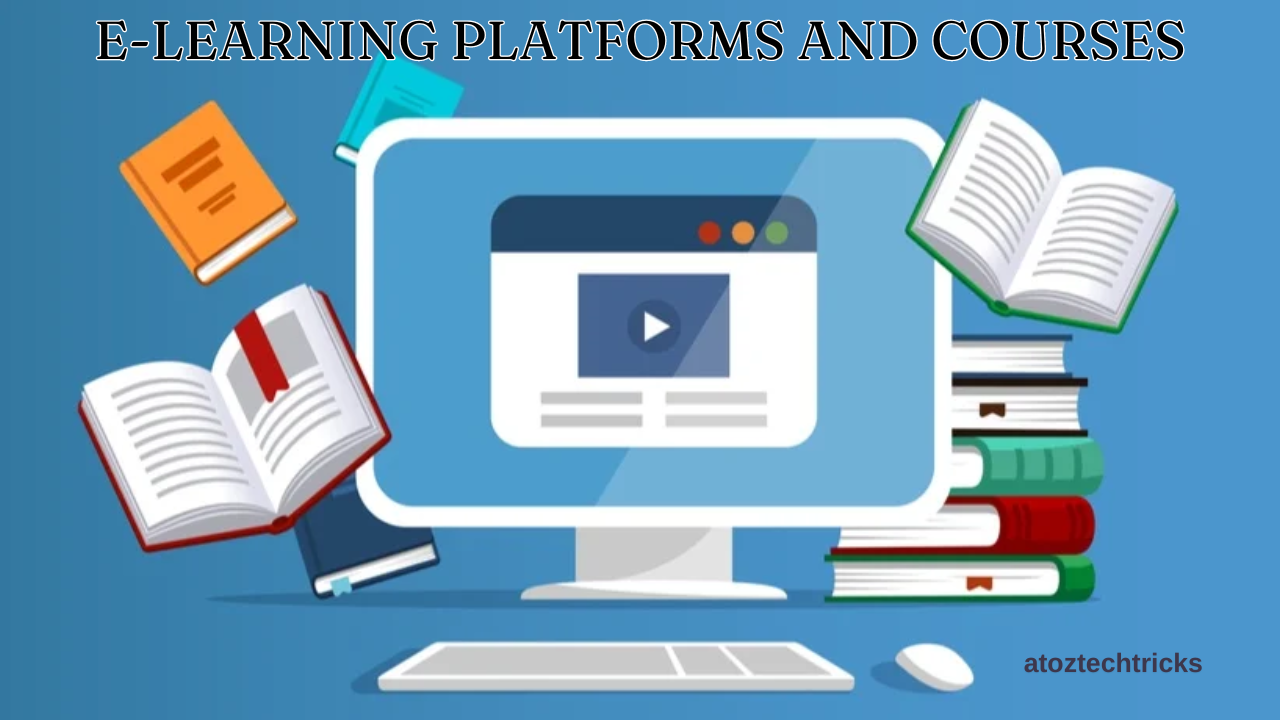E-learning Platforms and Courses: Revolutionizing Education in the Digital Age
In an era dominated by technological advancements, e-learning platforms and courses have emerged as transformative tools in education. These digital platforms have revolutionized how knowledge is imparted and acquired, making education more accessible, flexible, and personalized. This article delves into the evolution, benefits, challenges, and future of e-learning platforms and courses, providing a comprehensive overview of their impact on modern education.
The Evolution of E-learning
The concept of e-learning has evolved significantly over the years. What began as simple computer-based training programs in the 1960s has now transformed into a vast and dynamic ecosystem of online education. The rise of the internet in the 1990s paved the way for the development of Learning Management Systems (LMS), which facilitated the creation and delivery of online courses. As technology advanced, so did the capabilities of e-learning platforms, leading to the emergence of Massive Open Online Courses (MOOCs) in the early 2000s. These platforms, such as Coursera, edX, and Udacity, democratized education by offering high-quality courses from top universities and institutions to learners worldwide.
Mobile App Development for Education: Revolutionizing Learning in the Digital Age
Benefits of E-learning Platforms and Courses
E-learning platforms and courses offer numerous benefits, making them a preferred choice for learners and educators alike. Some of the key advantages include:
- Accessibility and Flexibility: E-learning platforms provide access to educational resources anytime, anywhere. This flexibility is particularly beneficial for working professionals, students in remote areas, and individuals with busy schedules. Learners can study at their own pace, allowing them to balance their education with other commitments.
- Cost-Effective Learning: Traditional education often comes with high costs, including tuition fees, textbooks, and commuting expenses. E-learning platforms offer a more affordable alternative, with many courses available for free or at a fraction of the cost of traditional education. This affordability has made quality education accessible to a broader audience.
- Personalized Learning Experience: E-learning platforms leverage data analytics and artificial intelligence to offer personalized learning experiences. These platforms can track a learner’s progress and adapt the course content to suit their learning style, pace, and preferences. This personalized approach enhances the learning experience and improves retention rates.
- Wide Range of Courses: E-learning platforms offer a vast array of courses on various subjects, from academic disciplines to professional skills and hobbies. This diversity allows learners to explore different fields and acquire new skills that can enhance their careers or personal growth.
- Interactive and Engaging Content: Modern e-learning platforms use multimedia elements such as videos, quizzes, simulations, and interactive assignments to make learning more engaging and effective. These features help in better understanding and retention of information compared to traditional lecture-based methods.
- Global Learning Community: E-learning platforms connect learners from around the world, fostering a global community of knowledge sharing and collaboration. Learners can interact with peers, participate in discussions, and collaborate on projects, enriching their learning experience and broadening their perspectives.

Popular E-learning Platforms
Several e-learning platforms have gained popularity due to their innovative approach to online education. Some of the leading platforms include:
- Coursera: Coursera partners with top universities and organizations to offer a wide range of courses, specializations, and degrees. It is known for its high-quality content, professional certifications, and collaboration with prestigious institutions like Stanford, Yale, and Google.
- edX: Founded by Harvard and MIT, edX offers free and paid courses from leading universities and institutions. It focuses on academic subjects and provides a platform for learners to earn verified certificates, professional credentials, and even degrees.
- Udemy: Udemy is a popular platform for learners looking to acquire new skills or enhance existing ones. It offers a vast library of courses on topics ranging from programming and design to personal development and hobbies. Udemy courses are created by individual instructors, allowing for a diverse range of content.
- Khan Academy: Khan Academy is a non-profit platform that provides free educational resources for students of all ages. It covers subjects like math, science, history, and more, with a focus on K-12 education. Khan Academy’s mission is to provide a free, world-class education to anyone, anywhere.
- LinkedIn Learning: LinkedIn Learning offers courses focused on professional development and career advancement. It provides access to a vast library of courses taught by industry experts, covering topics like business, technology, creative skills, and leadership.
- Skillshare: Skillshare is a platform that emphasizes creative learning, offering courses in design, photography, writing, and other artistic fields. It operates on a subscription model, allowing learners to access a wide range of classes for a monthly fee.
- Udacity: Udacity specializes in technology-related courses, particularly in areas like programming, data science, and artificial intelligence. It offers “nanodegree” programs that provide learners with job-ready skills and credentials recognized by industry leaders.
- FutureLearn: FutureLearn offers courses and degrees from leading universities and organizations, focusing on social learning through interactive discussions and group activities. It covers a wide range of subjects, from health and psychology to business and management.
Challenges of E-learning Platforms and Courses
Despite the numerous benefits, e-learning platforms and courses also face several challenges that can impact their effectiveness. Some of these challenges include:
- Digital Divide: While e-learning platforms have made education more accessible, the digital divide remains a significant barrier. Learners in rural or low-income areas may lack access to reliable internet connections, devices, or digital literacy skills, limiting their ability to benefit from online education.
- Engagement and Motivation: Maintaining learner engagement and motivation can be challenging in an online environment. Without the physical presence of instructors and peers, learners may feel isolated and struggle to stay motivated. This can lead to high dropout rates in online courses.
- Quality Control: With the proliferation of e-learning platforms and courses, ensuring the quality and credibility of content has become a concern. Not all courses are created equal, and some may lack the rigour or accuracy required for effective learning. It is essential for learners to carefully evaluate the quality of the courses they choose.
- Lack of Personal Interaction: E-learning platforms often lack the face-to-face interaction that is inherent in traditional classroom settings. This can limit opportunities for real-time feedback, personalized guidance, and networking, which are crucial for a well-rounded educational experience.
- Assessment and Accreditation: Assessing and accrediting online courses pose unique challenges. While some platforms offer certificates or degrees, the recognition and acceptance of these credentials by employers or academic institutions may vary. Establishing standardized assessment and accreditation processes is essential for the credibility of online education.
- Data Privacy and Security: E-learning platforms collect and store vast amounts of data on learners, raising concerns about data privacy and security. Protecting sensitive information and ensuring compliance with regulations like GDPR is critical for maintaining trust in these platforms.

The Future of E-learning
The future of e-learning platforms and courses is promising, with continued advancements in technology expected to drive innovation and growth in the sector. Some key trends shaping the future of e-learning include:
- Artificial Intelligence and Machine Learning: AI and machine learning are set to play a significant role in the future of e-learning. These technologies can enhance personalization by analyzing learner data and providing tailored content and recommendations. AI-powered chatbots and virtual tutors can also offer real-time support and feedback, improving the overall learning experience.
- Virtual and Augmented Reality: Virtual reality (VR) and augmented reality (AR) have the potential to revolutionize online education by creating immersive learning environments. VR and AR can simulate real-world scenarios, allowing learners to practice skills in a safe and controlled setting. These technologies are particularly valuable in fields like medicine, engineering, and the arts.
- Gamification: Gamification involves incorporating game-like elements into e-learning platforms to increase engagement and motivation. This can include features like badges, leaderboards, and rewards for completing tasks or reaching milestones. Gamification can make learning more interactive and enjoyable, particularly for younger learners.
Educational Consulting and Services: A Comprehensive Overview
- Microlearning: Microlearning is an emerging trend that focuses on delivering content in small, bite-sized chunks. This approach caters to the modern learner’s preference for short, focused learning sessions and can be particularly effective in skill-based training. Microlearning can be easily integrated into daily routines, making it ideal for busy professionals.
- Lifelong Learning: The concept of lifelong learning is gaining traction as the pace of technological change accelerates. E-learning platforms are well-positioned to support lifelong learning by offering courses that allow individuals to continuously update their skills and knowledge throughout their careers. This shift towards continuous education is essential in a rapidly evolving job market.
- Collaboration and Social Learning: Future e-learning platforms are likely to place greater emphasis on collaboration and social learning. Features like group projects, peer reviews, and discussion forums can foster a sense of community and enhance the learning experience. Social learning also allows learners to benefit from diverse perspectives and collective knowledge.
- Blockchain for Credentialing: Blockchain technology has the potential to transform how credentials are issued, verified, and shared. By using blockchain, e-learning platforms can create secure, tamper-proof records of learners’ achievements, making it easier for employers and institutions to verify qualifications. This can enhance the credibility and portability of online credentials.
- Increased Focus on Soft Skills: As automation and AI continue to reshape the workforce, there is a growing demand for soft skills such as communication, critical thinking, and emotional intelligence. E-learning platforms are expected to expand their offerings in these areas, helping learners develop the skills needed to thrive in a technology-driven world.

E-learning platforms and courses have fundamentally changed the landscape of education, offering new opportunities for learners and educators alike. While challenges remain, the benefits of e-learning are undeniable, from increased accessibility and affordability to personalized and engaging learning experiences. As technology continues to advance, the future of e-learning looks bright, with innovations such as AI, VR, and blockchain poised to further enhance the effectiveness and reach of online education. In a world where continuous learning is becoming increasingly essential, e-learning platforms will play a crucial role in shaping the future of education and empowering individuals to achieve their full potential.




Post Comment